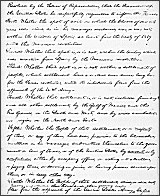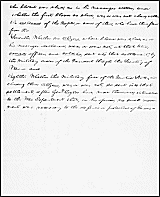
Lincoln's Spot Resolutions
Background
Tension has existed between the legislative and the executive branches of the U.S. government over war powers since the Constitution simultaneously vested Congress with the power to declare war and the President with the power of Commander in Chief. Although Jefferson insisted on congressional approval before sending troops into combat, later Presidents have not felt bound by this precedent. Their alternate view was boosted by the Supreme Court in 1827 in the case Martin v. Mott. The Court ruled that it was constitutional for Congress to vest the president with the discretionary authority to decide whether an emergency had arisen and to raise a militia to meet such a threat of invasion or civil insurrection. Nonetheless, in the winter of 1845-46, as relations between the United States and Mexico deteriorated, there was no express delineation of powers between the two branches.
Prior to Texas's independence, the Nueces River was recognized as the northern boundary of Mexico. Spain had fixed the Nueces as a border in 1816, and the United States ratified it in the 1819 treaty by which the United States had purchased Florida and renounced claims to Texas.
Even following Mexico's independence from Spain, American and European cartographers fixed the Texas border at the Nueces. When Texas declared its independence, however, it claimed as its territory an additional 150 miles of land, to the Rio Grande. With the annexation of Texas in 1845, the United States adopted Texas's position and claimed the Rio Grande as the border.
Mexico broke diplomatic relations with the United States and refused to recognize either the Texas annexation or the Rio Grande border. President James Polk (National Archives Identifier: 528666 ) sent a special envoy, John L. Slidell (National Archives Identifier: 528280), to propose cancellation of Mexico's debt to United States citizens who had incurred damages during the Mexican Revolution, provided Mexico would formally recognize the Rio Grande boundary. Slidell was also authorized to offer the Mexican government up to $30 million for California and New Mexico.
Between Slidell's arrival on December 6, 1845, and his departure in March 1846, the regime of President Jose Herrara was overthrown and a fervently nationalistic government under General Mariano Paredes seized power. Neither leader would speak to Slidell. When Paredes publicly reaffirmed Mexico's claim to all of Texas, Slidell left in a temper, convinced that Mexico should be "chastised."
Zachary Taylor
The agent for chastisement was already in place. On January 13, 1846, more than 3,500 troops commanded by General Zachary Taylor (National Archives Identifier: 527669) moved south under President Polk's order, from Corpus Christi on the Nueces River to a location on the north bank of the Rio Grande. Advancing on March 8 to Point Isabel, the U.S. troops found that the settlement had been burned by fleeing Mexicans. By March 28, the troops were near the mouth of the Rio Grande across from the Mexican town of Matamoros.
Polk claimed the move was a defensive measure, and expansionists and Democratic newspapers in the United States applauded his action. Whig newspapers said that the movement was an invasion of Mexico rather than a defense of Texas. While newspapers in Mexico called for war, General Pedro de Ampudia warned, "If you insist in remaining upon the soil of the department of Tamaulipas, it will clearly result that arms, and arms alone, must decide the question."
General Ampudia's prediction came true on April 25 when Mexican cavalry crossed the Rio Grande and attacked a mounted American patrol, killing five, wounding eleven, and capturing forty-seven.
President Polk
In Washington, President Polk, although unaware of the developments, had drafted a message asking Congress to declare war on Mexico on the basis of Mexico's failure to pay U.S. damage claims and refusal to meet with Slidell. At a cabinet meeting on May 9, he notified his cabinet that he would ask for war in a few days. Only Secretary of the Navy George Bancroft counseled for delay, waiting for a Mexican attack.
On that evening, Polk received Taylor's account of the April 25 skirmish. Polk revised his war message, then sent it to Congress on May 11 asserting, "Mexico has passed the boundary of the United States, has invaded our territory and shed American blood upon America's soil." On May 13, Congress declared war, with a vote of 40-2 in the Senate and 174-14 in the House.
Although Congress had declared war, it was not without reservation. An amendment was proposed, although defeated, to indicate that Congress did not approve of Polk's order to move troops into disputed territory. Sixty-seven Whig representatives voted against mobilization and appropriations for a war.
Ohio Senator Tom Corwin accused Polk of involving the United States in a war of aggression. Senator John C. Calhoun of South Carolina abstained from voting, correctly foreseeing that the war would aggravate sectional strife. Massachusetts Senator Daniel Webster (National Archives Identifier: 528348) voiced doubts about the constitutionality of Polk's actions, believing that Polk had failed to consult adequately with Congress. As the war deepened, "Conscience" Whigs denied Polk had tried to avoid war.
A freshman Whig Congressman from Illinois, Abraham Lincoln (National Archives Identifier: 528389), questioned whether the "spot" where blood had been shed was really U.S. soil. On December 22, 1847, he introduced the "Spot Resolutions," of which the second and third pages of Lincoln's handwritten copy are shown. One of several congressional resolutions opposing the war, it was never acted upon by the full Congress. Lincoln's action temporarily earned him a derisive nickname, "spotty Lincoln," coined by one Illinois newspaper.
Other citizens shared their legislators' concern, particularly those in the Northeast who saw the war as a ploy to extend slavery. The most celebrated was Henry David Thoreau, who refused to pay his $1 Massachusetts poll tax because he believed the war an immoral advancement of slavery.
Acerbic former President John Quincy Adams (National Archives Identifier: 527673) described the war as a southern expedition to find "bigger pens to cram with slaves." Regional writer James R. Lowell, author of the Biglow Papers, had his Yankee farmer Hosea Biglow scorn fighting to bring in new slave states. Charles Sumner (National Archives Identifier: 525357), a noted abolitionist, also condemned the war from pacifist principles. Philadelphian Joseph Sill's diary records widespread public disapproval for the war by October 1847. The Massachusetts state legislature resolved the war an unconstitutional action because it was initiated by order of the President with the "triple object of extending slavery, of strengthening the slave power and of obtaining the control of the free states."
Concern that Taylor's order sending troops into the disputed territory provoked the clash was foremost in an October 1847 article in one Whig newspaper, The American Review: "The Constitution contemplates that before deliberate hostilities shall be undertaken in any case, a declaration of war shall be made; but in this case a hostile aggressive move was made under the personal orders of the President."
Ironically, when Lincoln became President, he extended the war powers of the executive, action he had criticized as a Congressman. Following the firing on Fort Sumter, he declared a naval blockade on his own authority. The capture and condemnation of four runners led to a case that went to the Supreme Court. In 1863 the Court affirmed Lincoln's actions in the Prize Cases, 2 Black 635.
The "Spot Resolutions" are kept in the Records of the U.S. House of Representatives, RG 233, HR 30 A-B 3.
The Documents
National Archives and Records Administration
Records of the U.S. House of Representatives
RG 233, HR 30 A-B 3.
National Archives Identifier:
306605
National Archives and Records Administration
Records of the U.S. House of Representatives
RG 233, HR 30 A-B 3.
National Archives Identifier:
306605
Article Citation
Mueller, Jean West and Wynell B. Schamel. "Lincoln's Spot Resolutions." Social Education 52, 6 (October 1988): 455-457, 466.

